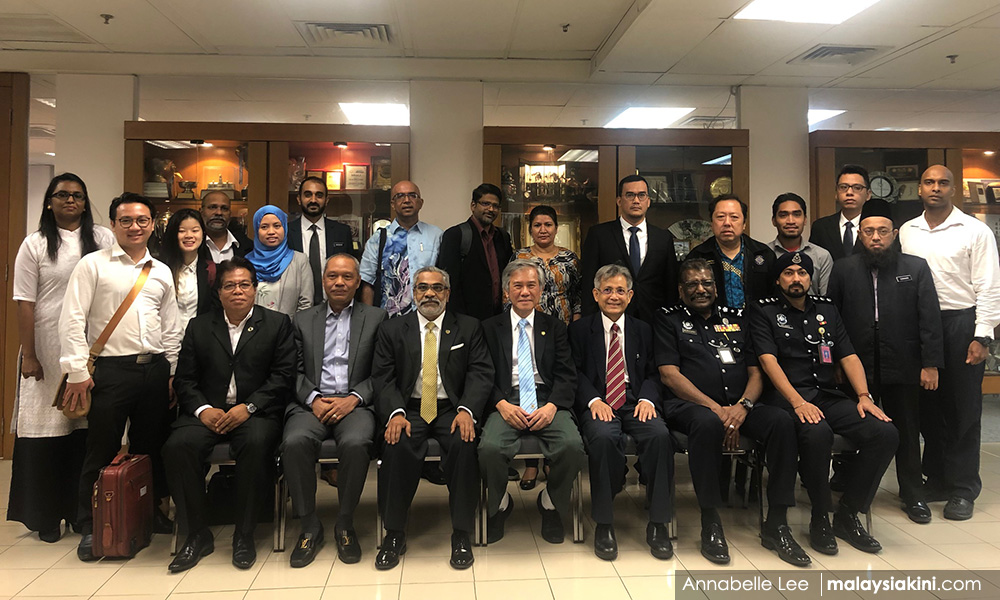
Malaysian Bar vice-president Roger Chan believes that excluding the inspector-general of police from being investigated by the Independent Police Complaints of Misconduct Commission (IPCMC) is unconstitutional.
"It contravenes the principle of equality under Article 8 of the Federal Constitution.
"Why should the law exclude the IGP? And more importantly, why is he given the power to judge his peers?" he asked during a press conference after chairing a discussion on the IPCMC bill in Kuala Lumpur today.
If passed in its current form, according to Bar Council constitutional law committee co-chair Andrew Khoo, the provision in the bill that allows for such an exclusion could be struck down as unconstitutional.
Tabled for first reading in the previous parliamentary session, Clause 31(4) of the bill states that any complaints about the IGP will be heard by a special disciplinary board set up by the chief secretary to the government.
Wrongdoing by other police personnel, meanwhile, will be subject to IPCMC's scrutiny.
Article 8 of the Federal Constitution stipulates that all persons are equal before the law and are entitled to equal protection of the law.
It also outlaws any discrimination under the law even if the person is "under the employment of a public authority."
Remove exceptions
The Bar also questioned why police conduct under the IGP’s Standing Orders is excluded from the IPCMC’s purview, as stated in Clause 22(2) of the bill.
The Standing Orders, enacted under Section 97 of the Police Act 1967, are presently classified as an official secret and are thus unavailable to the public.
M Ramachelvam, the Bar’s co-chairperson on its IPCMC taskforce, urged for the Standing Orders to be declassified and for the clause to be removed from the bill.
“If one looks at the Police Act 1967, in fact, all misconduct comes within the Standing Orders.
“So if one excludes those matters that are within the Standing Orders from coming within the jurisdiction of the IPCMC, there really won’t be much for the IPCMC to do.
“Our view is that they should remove that clause [...],” he said.
The Bar had earlier held a three-hour discussion on the IPCMC with lawyers and representatives from civil society organisations, Suhakam, the Prime Minister’s Department, the Attorney-General’s Chambers, as well as the National Centre for Governance, Integrity and Anti-Corruption (GIACC).
The police were represented by IGP Secretariat research and development officer SAC R Munusamy and IGP Secretariat legal division officer ASP Harjinder Singh.
Amend or no bite
Suhakam commissioner Hishamudin Yunus commended Putrajaya for finally tabling the IPCMC bill 14 years after it was mooted.
However, he urged the government to expedite amendments or risk establishing a commission that had no “bite”.
“There are many things in the bill that need to be improved for the bill to have bite, for the bill to be effective and for the commission to enjoy both the trust of the public as well as (of) the police force,” he told the same press conference.
Hishamudin, a former Court of Appeal judge, further called for the bill to be referred to the Parliamentary Select Committee on the Consideration of Bills in the next parliament sitting.
The bill has been criticised for giving too much power to the prime minister to decide the composition and members of the IPCMC, giving rise to questions about its ability to function independently.
Groups also want the commission’s scope to extend beyond misconduct that occur inside police stations to cover all police operations regardless of location.
De facto Law Minister Liew Vui Keong previously said that the bill could be amendedahead of its second and third reading during the upcoming Dewan Rakyat sitting, slated to begin on Oct 7.
Today, Chan said that the Bar will compile its feedback on the bill and present it to Liew during their next meeting on Sept 5.
The IPCMC was first mooted in 2005 by the Royal Commission to Enhance the Operation and Management of the Royal Malaysia Police, which had been chaired by former chief justice Mohamed Dzaiddin Abdullah. - Mkini
No comments:
Post a Comment
Note: Only a member of this blog may post a comment.